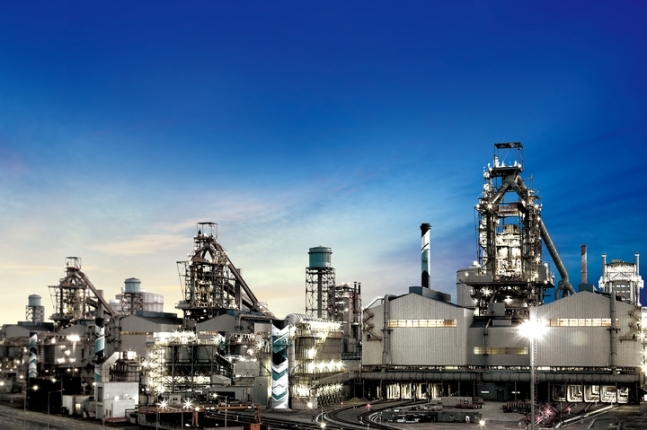 |
Hyundai Steel's Dangjin Plant (Hyundai Steel) |
According to industry news reports on Wednesday, Hyundai Steel’s labor union, which has been at the negotiation table since March, warned of going on strike if its talks with the management fails on Thursday. Ninety-four percent of its union members have voted in favor of a walkout in July, they said.
The labor union demands a 165,200 won ($118) raise in workers' base monthly salary and 15 percent of operating profit shared as incentives for employees. They argued that other Hyundai affiliates, such as Hyundai Mobis, have paid an extra 4 million won per worker as a special incentive.
The timing of the union staging a walkout is serious, market insiders said, referring to Posco's struggle to recover its damaged facilities in Pohang, North Gyeongsang Province from Typhoon Hinnamnor. As steel processing operations stopped due to electrical disruptions, Posco is estimated to lose some 2.04 trillion won ($1.5 billion) in sales before a full recovery. Posco and Hyundai make up more than half of the country’s steel production. A supply disruption for the two steelmakers could trigger a domino effect to related industries such as automotive, shipbuilding and construction, they said.
“As unstable supply of steel products continues, the price hike of local steel materials will impact other manufacturing industries. It also gives a chance to Chinese steelmakers who offer products at much lower prices,” said an industry insider.
According to the Korea Iron & Steel Association, out of a total of 70.4 million metric tons of steel produced domestically last year, Posco manufactured some 16.8 million tons, while Hyundai Steel produced some 19.2 million tons. The two firms’ production volumes account for some 51 percent of the total steel produced in the country.
The retail price of steel sheets rose to 1.1 million won per ton as of last week, about a 10 percent increase compared to August. The retail prices of iron bars and stainless steel last week also rose 5 percent and 1 percent, respectively, compared to the previous month.
Meanwhile, Posco said Wednesday that it expects to resume supplying entire steel products manufactured from its Pohang plant within three months, making an all-out effort to normalize production volume.
The company official said Posco currently has two to three months’ worth of steel supply in stock by volume. The official stressed that it would prepare measures to avoid possible supply disruption, despite the very low probability.
Posco was at the center of discussion at the National Assembly late last week as the ruling People Power Party’s lawmakers denounced Posco executives for their lack of preparation for the massive damage caused at the Posco Pohang plant. They claimed that Posco didn't spare 20 billion won to prevent damage from natural disasters, despite the fact that the company was aware of the need to do so. The Industry Ministry also echoed a similar view and said Posco Group Chairman Choi Jung-woo will be invited as a witness for a parliamentary inspection to analyze the massive damages at the Pohang plant due to the typhoon.







![[Today’s K-pop] Blackpink’s Jennie, Lisa invited to Coachella as solo acts](http://res.heraldm.com/phpwas/restmb_idxmake.php?idx=644&simg=/content/image/2024/11/21/20241121050099_0.jpg)